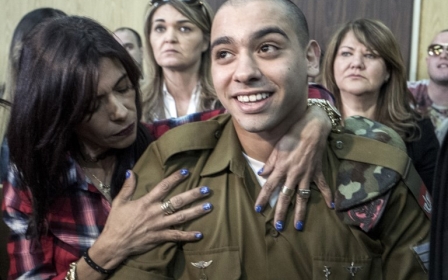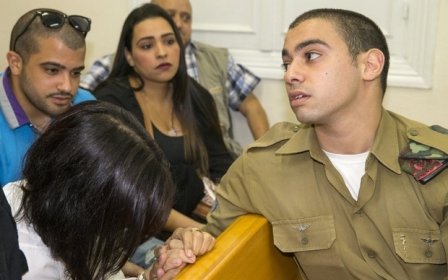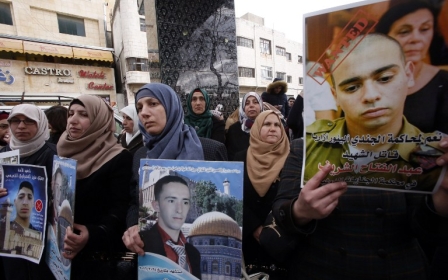Elor Azaria says he has 'no remorse whatsoever' for killing wounded Palestinian
An Israeli soldier who spent nine months in prison for killing a wounded Palestinian said three months after being released that he has “no remorse whatsoever”, in excerpts from an interview published on Wednesday.
Speaking to right-wing Israeli newspaper Israel Hayom - which will publish the full interview on Friday - 22-year-old Elor Azaria said that he did not regret his actions in March 2016, when he shot dead 21-year-old Palestinian Abd al-Fattah Yusri al-Sharif in the Israeli-occupied West Bank city of Hebron.
Sharif had been lying motionless on the ground, wounded after an attempted stabbing attack on Israeli soldiers, when Azaria shot him in the head. Another Palestinian, Ramzi Aziz al-Tamimi al-Qasrawi, 21, was killed by Israeli forces during the same incident.
"I am at peace with what I did, I acted properly and followed my inner truth,” Azaria told Israel Hayom. "There is no doubt that if you took me back to those seconds in Hebron, when the event was unfolding, I would act exactly the same all over again because that is what had to be done."
"I have no remorse whatsoever," he added.
The shooting, which was caught on camera and made public by Israeli anti-occupation NGO B’Tselem, sparked uproar in Israel.
Many argued that Azaria acted properly in killing Sharif and did not deserve to be punished, while others said that the Palestinian did not constitute a threat at the time and that Azaria’s actions violated military rules of engagement.
"I was told by the interrogator, 'You are going to be charged with murdering a Palestinian,'” Azaria said recalling his first interrogation on the case. “I was shocked and answered, 'What murder? What's wrong with you? What Palestinian? He's a terrorist.'”
The former soldier went on to tell Israel Hayom that Sharif had a knife lying next to him and that the young Palestinian man’s heavy coat had led him to believe that he still constituted a threat and might have been carrying explosives.
However, video footage showed that the knife had been kicked closer to Sharif’s body after he was shot, and that some Israelis on the scene had worn similarly thick coats.
Azaria also reiterated the line of defence used by his lawyers during the trial, telling Israel Hayom that he was used as a scapegoat by the Israeli army.
“An IDF soldier was thrown under the bus just so the Palestinians wouldn't launch a day of rage,” he said. "If I had had a fair trial I would have been fully acquitted and a lot of people would have had to lower their gaze."
A number of human rights organisations - such as B’Tselem - have long argued that Israeli military courts only rarely prosecute soldiers accused of killing Palestinians, while using select cases to serve as a “fig leaf” to provide “the semblance of a functioning justice system [that] allows Israeli officials to deny claims made both in Israel and abroad that Israel does not enforce the law on soldiers who harm Palestinians”.
Refusing to plead guilty, Azaria was initially sentenced to 18 months in prison for manslaughter, only to receive a hero’s welcome upon being released in May after only serving half of his sentence.
Earlier this month, Israeli media revealed that Azaria had translated his high-profile military court conviction into a life of luxury, receiving gifts and perks from supporters across the country who call him "our king".
With his stint in prison behind him, Azaria regularly offers advice to Israelis, and is reported to be considering studying law to defend soldiers accused of similar offences, according to Israeli news site Mako.
However, Azaria’s status as a hero for many Israelis has its limits, as Israel's ministry of internal security refused his request for a gun licence earlier this month.
New MEE newsletter: Jerusalem Dispatch
Sign up to get the latest insights and analysis on Israel-Palestine, alongside Turkey Unpacked and other MEE newsletters
Middle East Eye delivers independent and unrivalled coverage and analysis of the Middle East, North Africa and beyond. To learn more about republishing this content and the associated fees, please fill out this form. More about MEE can be found here.




